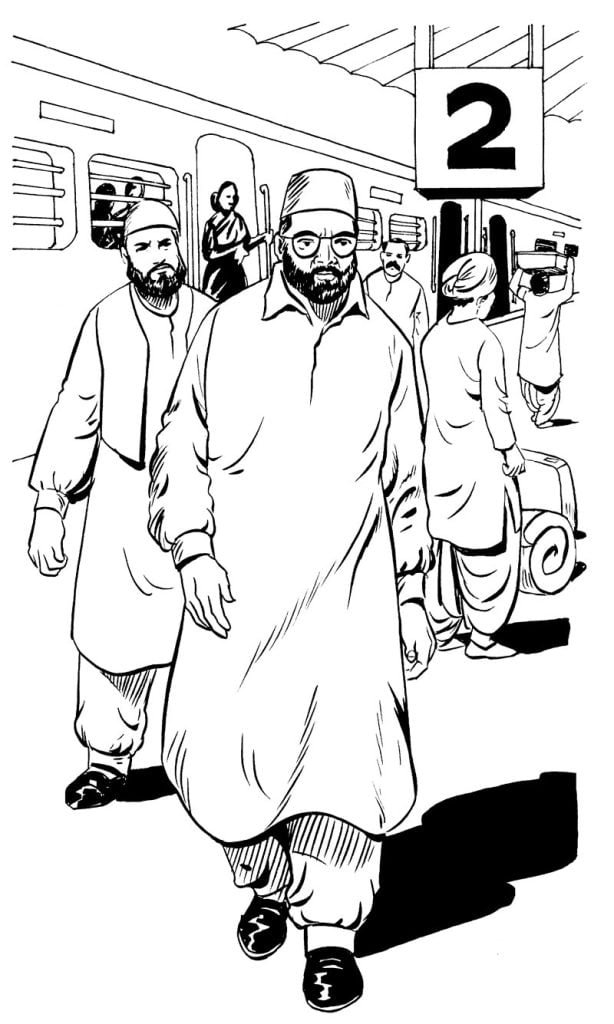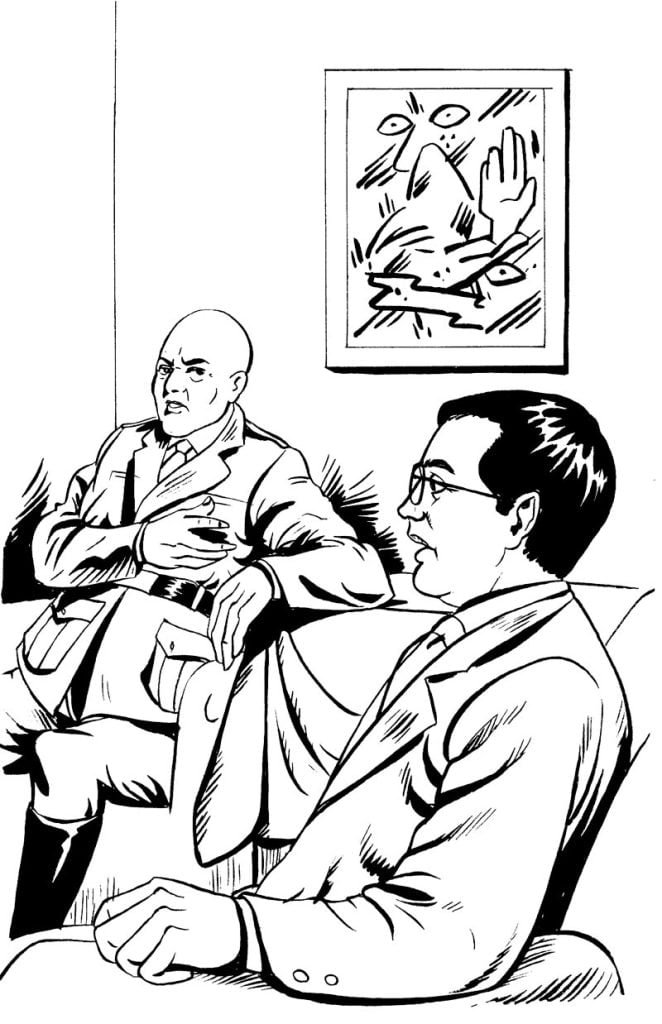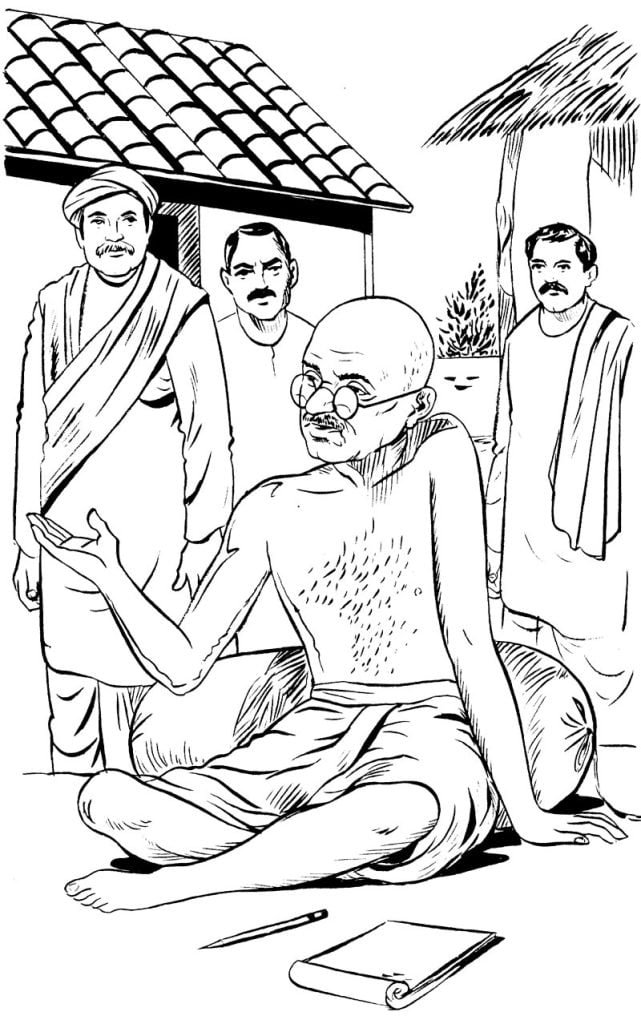On the night on 16th January, 1941 his nephew had stationed a car at the planned spot at 9 p.m. Subhash took meals with the family.
Then, he emerged out of the back door of his house in the guise of a Pathan. He had grown thick beard and moustaches to look like a frontier man. He walked to the stationed car. His nephew Shishirnath was at the wheel already.
Subhash sat on the back seat quietly. No words were exchanged. They knew the script. Shishir started the car and drove away. The car left Calcutta city and kept moving all night and reached Barai, a place near Dhanbad.
The elder brother of Shishir lived there. It was Ashoknath Bose. Subhash spent entire day in his nephew’s bungalow. He was introduced to the other people as an insurance agent.

After the darkness fell the brothers again set out with their uncle in car and reached the railway station of Gomoh from where Subhash took a train to North-Western Frontier Province.
Shishir reached Calcutta and he reported the disappearance of Subhash Bose. Subhash was scheduled to appear in the court on 27th January. The news shocked the authorities. They knew that their enemy had given them a slip.
Meanwhile, the train carrying Subhash chugged on relentlessly passing through a maze of railway stations with mysterious names. Finally it reached Peshawar. Subhash had travelled as Mohammad Ziauddin, the insurance agent. No one could suspect as he looked a perfect Muslim Pathan, unfortunately a deaf and dumb who was going to the frontier province to seek blessings at some holy durgah.
Out of the station, Subhash sat in a tonga and showed the driver a slip on which was written his destination—Tajmahal Hotel. Subhash was not alone. He was accompanied by a confidant, Akbar who followed him in another tonga. Infact, Akbar was with him all along the train journey as the nephew of the dumb and deaf uncle to deal with inquisitive kind of pests.
Subhash stayed at the hotel for a day. Then he was taken to a rented house arranged by Bhagat Ram, a member of the local Forward Bloc.
In the house plans were discussed to smuggle out Subhash to Afghanistan. Subhash spent a week in that house in anxiety discussing plans. The sooner he got away was the better.
On 26th January, 1941 Bhagat Ram and Subhash set out for Kabul accompanied by two local confidants. Bhagat Ram was passing as Rahmat Khan. Subhash was his uncle Ziauddin. On the way Rahman Khan would explain to others that he was taking his uncle on a pilgrimage.
They reached Jamrood Chowki from where tribal area began. Eleven miles away was Khazoori Maidan where the soldiers camped. It was a buffer zone between Afghanistan and British India. The confidants were sent back.
Through bridal path they circumvented Khazoori Maidan. It took them two hours. Subhash was very tired because he was unaccustomed to hill journey and wanted to take rest. But they could not stop. Bhagat revealed that it was a dangerous tribal zone.
By midnight they reached Pushkan Mian Village. They spent the night there. Next day the two made it to another village.
On 28th January, 1941 they reached near the Afghan border at midnight. Bhagat Ram managed to buy two ponies and rode into the land of Afghans after crossing a snowy valley.
They rested at a village called Garhi and continued on. The journey further looked risky. The people were looking at them suspiciously. Many of them asked questions. Pathans could not believe that the healthy man (Subhash) could be dumb and deaf. One idiot even wanted to touch his tongue to make sure it could not talk.
When they reached the highway to Kabul Bhagat Ram tried to get lift from truckers. No one obliged. At last a kind trucker carried them to Jalalabad and then to Shareef Dargah.
Bhagat Ram was to meet a person named Hazi Mohammad Amin who would give them valuable tips. Bhagat and Amin had become friendly when they had served sentence together in Peshawar jail in connection with a political movement. Amin was there. He provided useful information.
The two were able to pass the check post and reached Kabul by tonga. They stayed in an inn. The next day they tried to contact foreign embassies. They wanted to talk to the officials of Soviet embassy. An Afghan spy sniffed them out. He wanted to take Subhash and Bhagat Ram to the police station for questioning. Bhagat Ram bribed him with his costly wrist watch.
They quickly shifted to the house of one Mr. Malhotra, an acquaintance of Bhagat Ram. Then, an Italian minister visited Kabul. Somehow Subhash managed to meet the minister whose name was Alberto Kuaroni. They talked whole night. The minister sent a report about it to Rome.
Germany and Italy wanted to allow Subhash to their countries. They requested Russia to help Subhash to reach Germany. A German engineer contacted Subhash and took him in his car to Samarkand, by train to Moscow and then finally to Berlin by air.
After a great ordeal and travails Subhash reached where he wanted to be. When Gandhiji and people of India learnt about the escape of Subhash they admired his courage. It was one of the most sensational news of that period.
In Berlin, high Nazi official Riben Tropp received Subhash Bose who made three urgent requests for India’s cause:
1. Germany must provide a facility to make it possible for Subhash to broadcast anti-British speeches over radio to reach Indian people.
2. Indian soldiers taken prisoners in war in Europe be allowed to form Azad Hind Fauz.
3. When time comes for freedom of India then Germany, Japan and Italy would support it and extend due recognition.
The first two demands were accepted readily but Germany and Italy did not commit themselves on the third demand.
Subhash started raising Azad Hind Fauz with Indian P.O.Ws. as Germans invaded Russia. He set up army camps in Rome and Paris which was under German occupation. 3000 strong Azad Hind Fauz came into existence.
Germany had assigned two competent officials to help and serve the cause of Subhash. They were trusted soldiers of Adolf Hitler. Subhash appreciated their dedicated help.
Subhash told his confidant Rahmat Khan, “Time has come to propagate against British in other countries. It is possible that the world politics will take action to drive away the British from India”.
Subhash was becoming very impatient to see British expelled from India. But the goal was appearing very far. In his anxiety to see the end of British rule he didn’t go to meet his wife even who was in German occupation zone.
Subhash wanted to win the confidence of Hitler. He wrote to him how India could help Axis countries win the war. Hitler did not reply.
In second letter Subhash proposed that if Germany and Italy free India from the British rule the Independent India will pay back whatever money it cost them to achieve the goal.
When no reply came he wrote a third letter to Hitler advising him to launch direct attack on British commands wherever they were including India. Again no response came from the German dictator.
To put pressure on Hitler Subhash went to Italy to meet Mussolini who was more sympathetic to India’s case. Mussolini too was not forthcoming. He showed no interest in the independence of India.
It was very frustrating for Subhash. The situation was extremely hopeless. In such down mood he thought of his wife. He went to her to find some solace in her love. But he could not stay with her for long as the cause of India’s freedom kept haunting his mind. Hitler’s apathy was caused by his low opinion of Indians. Once Hitler had privately remarked that Indians so divided by caste systems, religions, languages and plagued by corruption, nepotism, social evils, fatalism and blind faiths would not be fit to survive independently even in next 200 years.
The image of Indians in the west was very bad. No one believed that Indians could do anything more than play been flute to snakes and juggle with monkeys. And the practice of untouchability was damning Indians in the eyes of the world.
When Subhash returned to Berlin he found to his pleasant surprise that the situation was changing. Germans were becoming receptive. Hitler was no more totally negative.

It appears that Hitler and Mussolini had discussed the case of India and found merit in what Subhash was saying. They had now realised that helping Subhash could create trouble for the British which would further weaken the enemy.
Meanwhile in India, frustrated with the continued negative attitude of the British rulers the Congress party had finally decided to adopt agressive postures against the British. A lot of things had happened after the departure of Subhash Bose from India.
After it became known to British that Subhash had joined hands with Axis powers and was broadcasting rebellious messages to Indian people on Radio Berlin the Indian government began vicious propaganda against him. The British tried to win over Congress leaders to their side but failed. Congressmen had adopted a non committal attitude. They wanted freedom but were failing to make up their minds against launching any agitation.
Meanwhile, Germans had invaded Denmark and British were driven away from there. In Britain Winston Churchil had taken over the rule of England. He wanted to befriend Congress.
But Congress placed two conditions for its support to England in the war effort. It maintained that only after the acceptance of the conditions the Congress would come forward to help out British.
The first condition was full freedom for India after the end of the war. The second condition was immediate installation of Interim Government of Indians in New Delhi pending the full independence.
But Churchil was an arrogant Englishman of superior airs. He never had any respect for Indians who to him were unmitigated barbarians unfit for any responsibilities.
So, granting independence was unthinkable to him. He said that Indians could be accommodated in some arrangement within colonial rule.
It angered the Congressmen. It was clear that Britain was not going to concede any concessions to Indians for their support in war. The patience of the Congressmen had run out.
Gandhiji first started personal protest against British government. It was to be in the form of Satyagraha. He accepted the support of Acharya Vinoba Bhave in it.

Meanwhile, Britain had declared war against Japan also. Its resources were getting thin and stretched. America was putting pressure on Britain to grant independence to India. Britain offered to create Pakistan before the grant of independence and wanted to keep command of armed forces. Sir Stafford Cripps came to India with the proposal. The Congress rejected it.
The people of India were getting restless. The Congress held a session and discussed what kind of agitation it could launch. After a lot of debate ‘Quit India’ proposal was passed to throw a direct challenge to British rule.
On 8th August, 1942 Gandhiji gave ultimatum to British to quit India within a week failing which the Congress would launch countrywide ‘Quit India’ movement as the decisive battle against the foreign rule.
The ultimatum shocked the British. They had never expected meek and soft spoken Gandhiji to roar like a lion.
Subhash was very pleased at learning that Congress party had finally decided to face the reality and start aggressive Quit India Movement. He said, “At last Congress has come to the basic ground I had adopted. The solution of all the problems of India lay in the destruction of the British rule.”
Gandhiji was quickly arrested and jailed. In jail he announced 21day fast. It worried the Viceroy. He knew the grim consequences if he died. But the British Premier Winston Churchil advised, ‘‘We must not bend before that old skinny pauper. Let him die. He has always been our enemy.”
Germans created facilities for the broadcast of the messages of Subhash over short wave radio and for raising Indian National Army which Subhash preferred to call Azad Hind Fauz.
Wilham Keppler invited Subhash for discussions. Subhash gave him all his plans against the British rule.
After a hard work of seven months Subhash established Azad Hind Fauz in Berlin. The Fauz people took over the task of broadcasting work and military training.
In 1942, A.C.N. Nambiar joined Azad Hind Fauz. He had been a correspondent in Europe for 18 years. An ex-Congressman called Ganmule who was in Germany also became a member. Girija Kumar Mukherji and M.R. Vyas were incharge of broadcasting.
On the appeal of Subhash Bose, 45000 Indian soldiers fighting in Africa for the English changed sides and joined German forces under Colonel Hassan Ali. It had enhanced the esteem of Subhash in the German eyes. Hitler also realised how influential he was in Indian context.
Radio Berlin was regularly broadcasting messages of Subhash to Indian people. He would brief people about what he was doing abroad for the liberation of India.
He began his first broadcast to his countrymen with a couplet of India’s last Emperor, Bahadurshah Zafar to the following effect:
‘As long as the faithfuls wear the scent of loyalty without let down,
The heat of India will keep searing the London crown.’
When the British government arrested Gandhiji in the wake of ‘Quit India’ movement and cracked down on Congress Party, Subhash exhorted the countrymen to keep up the fight against the British enemy.
Meanwhile Indian freedom efforts were getting a boost in Japan. In 1915 Indian revolu-tionary Ras Bihari Bose had gone to Japan to avoid arrest at the hands of British police. Since then he had been living in Japan having married a local girl. He has still maintaining contact with Indian revolutionaries.
Japan had begun its chapter in the Second World War with a surprise attack on Pearl Harbour of USA. Its armies invaded South Asian countries on a massive scale.
Ras Bihari Bose had become active finding the situation favourable. The marching armies of Japan had captured several Indian soldiers who were in British armies. Ras Bihari set up ‘Indian Independence League’ and raised an army of local Indians and P.O.Ws. Japanese helped in giving locals military training.
Captain Manmohan Singh was Commander of this army.
In the battle for Singapore 40,000 Indian soldiers of British army had surrendered to the Japanese. They were turned over to the above army.
Ras Bihari Bose wanted Subhash Bose to take charge of this army and launch an open battle against the British from the Asian soil. He formally invited Subhash to come over to Japan.
For Subhash it was a dream come true.
But he wanted to meet Hitler first before leaving for Japan. Hitler agreed to meet him after a lot of persuasion. Subhash asked him to declare India a free country after war. But Hitler showed reluctance. He still was not sure of the Indians.
He said, “India is socially fragmented. I don’t think you will get freedom from your own weaknesses even in 150 years.”
Once again Hitler disappointed him with his underestimation of Indians.
Meanwhile, Emily Bose had born a daughter to Subhash. It came as a consolation. He went to Vienna to see his wife and the newborn daughter.
Germans were in the thick of war. The sea and air were unsafe propositions. Going to Italy was extremely risky. The departure for Japan kept being postponed for reasons of travel safety.
In 1943 early January, Subhash asked his wife to join him in Berlin where he was camping to remain in touch with his army command and to work out departure.
Japanese were pressing Germany to send Subhash to them. They knew the real worth of the Indian leader. With Subhash on their side the Japanese could mount pressure on British who were entrenched in India.
Germans agreed to transport Subhash to Japan in a U-boat. All was set and Subhash given the travel plans. Subhash handed over the charge of European Azad Hind Fauz to Nambiar and prepared to leave Germany.
He travelled to Keel harbour where he and his aide, Abid Hussain boarded U-190 submarine on 8th February, 1943. For four months the submarines negotiated the sea evading enemies and progressing eastwards. U-190 had taken them to Madagascar where a Japanese submarine had taken charge of them. At last on 6th May, 1943 they reached the Japanese coast.
The departure of Subhash was known only to a few persons. Berlin Radio kept airing his pre-recorded speeches creating the impression that he was still in Europe.
Subhash was transported to Tokyo in a plane. In Tokyo, he met General Tojo who was very impressed with the personality and the confidence of the former.
On 16th June, 1943 Subhash attended the Japanese Parliament where he raised the issue of the freedom of India and Japanese role in it. The Japan government assured all possible help to India’s cause and honoured Subhash.
Subhash told to correspondents, “The people of my country want to give their blood for their independence. We only want material help from Japan. The battle of freedom shall be fought by Indian soldiers themselves.”
He sent a message to his countrymen—‘The people of India must prepare for the final battle. With the cooperation of Japan action we will soon begin to destroy the British rule.’

